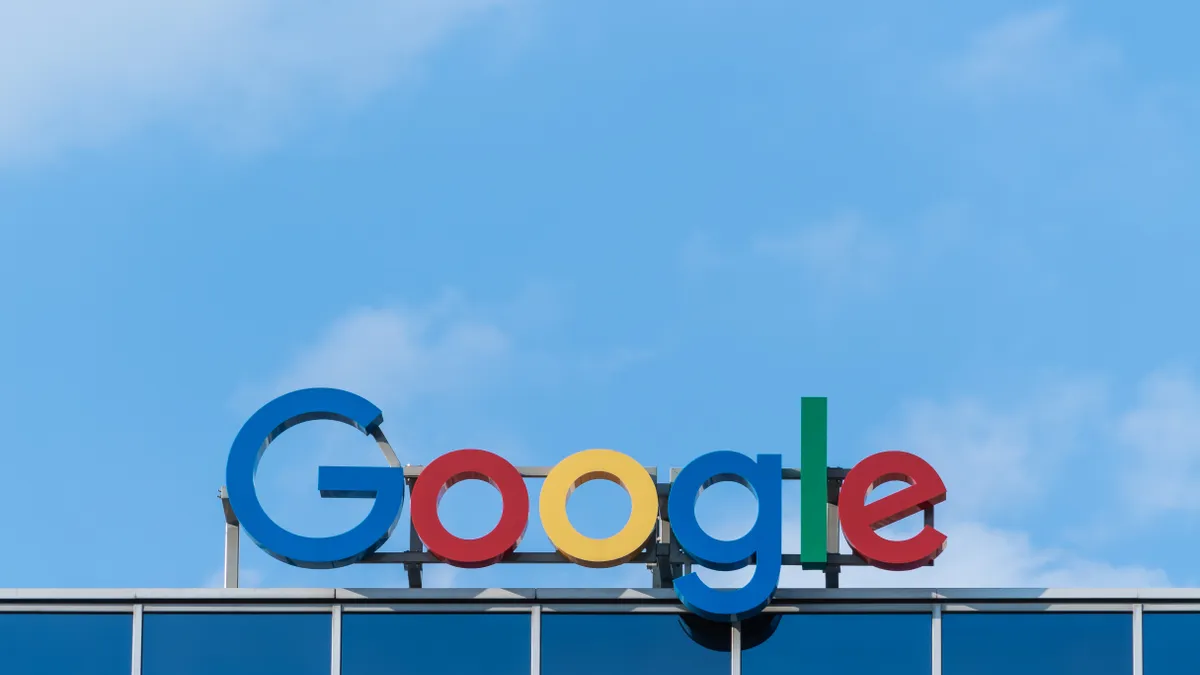UPDATE: Feb. 22, 2019: Google has decided to eliminate the use of mandatory arbitration agreements for current and future employees, the company said in an emailed statement to HR Dive. The change is effective March 21, and will apply to the company's U.S. and international employees. However, the company said it would not change its approach with respect to disputes with former employees or settled claims. Current employees on or after March 21 can litigate past claims as long as the claim is not already settled, Google said.
The Google Walkout For Real Change Twitter account posted Friday calling the news a victory; "This is still just the beginning," the group said. End Forced Arbitration posted a similar message, critiquing the updated policy in a graphic.
Dive Brief:
- A "mix of organizers" from the November 2018 worldwide Google walkout staged a campaign via Twitter and Instagram Tuesday to raise awareness of the use of forced arbitration agreements in tech firms' employment agreements.
- The group, End Forced Arbitration, was formed in December 2018 after a broader effort to oppose the practice, according to a statement signed by multiple Google employees. Posts from the group Tuesday included pre-recorded presentations and conversations with legal professors, research and statistics, and information on legislation introduced in both the U.S. House of Representatives and U.S. Senate to amend federal law on arbitration disputes in employment. The group claimed it surveyed employees at more than 30 tech industry companies in addition to workers at more than 10 temporary, vendor and contractor (TVC) suppliers, and found that "not a single business could meet [three] basic criteria of a transparent and equitable workplace." Those three criteria include: no gag rule, no class action waivers and arbitration being optional.
- The account named Netflix, Facebook, Uber, Airbnb, Two Sigma and staffing firm Adecco in one graphic as being among those businesses, and it tagged several others in subsequent posts. The group told workers to contact members of Congress and provided a list of potential remedies, including filing police reports about harassment incidents, filing U.S. Equal Employment Opportunity Commission claims and requesting a different arbitration panel configuration.
Dive Insight:
The use of mandatory arbitration to settle employment disputes — particularly those involving harassment, assault or discrimination — has become one of the most controversial aspects of employment law in the past year. High-profile accusations of sexual misconduct have put the practice, relatively commonplace in industries like tech, in a highly unfavorable public spotlight, and employers now face mounting pressure to end it.
Who is involved in an arbitration? Well, unlike a normal trial, arbitration hearings happen behind closed doors with a handful of people. #EndForcedArbitration #googlewalkout #MeToo #TimesUp #DumpForcedArbitration pic.twitter.com/bxrv7xzMvH
— End Forced Arbitration (@endforcedarb) January 15, 2019
Google Walkout for Real Change, the group that has claimed to be behind November's walkout, made nixing arbitration in cases of harassment and discrimination the first issue on its list of five demands to Google. The company responded with a document outlining several strategic steps it would take, including making arbitration optional for individual sexual harassment and sexual assault claims, similar to changes announced at Uber. But End Forced Arbitration criticized the statement, saying it did not guarantee the same options for TVC workers at the company nor end forced arbitration for other complaints, like those alleging discrimination.
Opinions vary among employment law professionals as to the true effectiveness and efficiency of arbitration — from both the employer and employee perspective. Worker advocates have been vocal in their opposition of the policies, saying they reduce accountability of those accused of harassment and misconduct while disproportionately affecting women and people of color. Employer advocates claim the process can be more efficient for both parties while also ensuring privacy for victims.
But employers are discovering those efficiencies aren't always guaranteed. Chipotle, for example, complained to a federal court that it was suffering "immediate harm" from its own lengthy processing of arbitration procedures following a judge's decision that its class action waiver should apply to workers who brought a wage and hour suit against the company.
Competitors Microsoft and Facebook have ostensibly decided to end mandatory arbitration for sex harassment claims. Google, meanwhile, faces pressure not only for its continuation of the practice in other contexts, but also for its alleged "exit packages" for executives accused of sexual misconduct.















